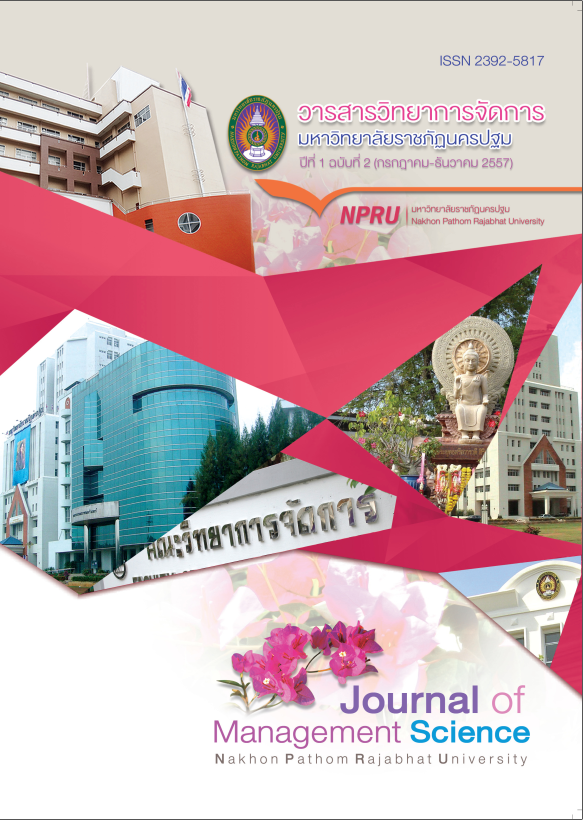Confirmatory Factor Analysis of transformation leadership in the Graduate Students’ Perspectives
Main Article Content
Abstract
The study entitled “Confirmatory Factor Analysis of transformation leadership in the Graduate Students’ Perspectives” aims to 1) study the attitude towards the transformation leadership in the graduate students’ perspectives, and 2 ) carry out the confirmatory factor analysis of transformation leadership in the graduate students’ perspectives. A questionnaire was used in data collection from those 481 graduate students in Bangkok while Frequency, Percentage, Means, Standard Deviation, Pearson’s Correlation Analysis, and Confirmatory Factor Analysis were utilized in data analysis.
It is revealed that all values on the attitude towards the transformation leadership of those graduate students are at the high level. When arranged, it is found that the ideological influence is at the highest level (Mean = 3.60) followed by inspiration creation (Mean = 3.56), concern of individual (Mean = 3.54), and wisdom encouragement (Mean = 3.52) respectively.
For the confrmatory factor analysis, it shows that 1) the transformation leadership on idealized influence is caused by the fact that the executives are concerned with morality and ethics in making their various decisions (λY = 0.77) the executives behave in the trustful ways (λY = 0.77) the executives and the staff together set up the plans and targets (λY = 0.77) 2) the transformation leadership on inspiration motivation is caused by the fact that the executives obviously inform all staff the policies and the working ways and also inspire the staff to work as of the policies (λY = 0.79) the executives inspire and encourage the staff to be more energetic in working in order to achieve their goals (λY = 0.75) the executives communicate or speak with all staff in positive ways (λY = 0.73) the executives focus on the creative solution for problems and settle the conflicts prior to their spreading out (λY = 0.73) 3) the transformation leadership on intellectual stimulation is caused by the fact that the executives promote the staff to have analytical thinking and enable them to solve the problems in the more creative ways (λY = 0.77) the executives support the staff in looking at the problems in different and varied dimensions (λY = 0.75) the executives support the staff in solving the problems in newer ways (λY = 0.73) 4) the transformation leadership on individualized consideration is caused by the fact that the executives assign the works in the putting the right man in the right job way (λY = 0.77) the executives listen and show that they understand the staff’s sayings (λY =0.77) the executives provide the staff the fruitful recommendations in developing their strength (λY = 0.76) the executives care in talking with the staff on their affairs individually in the friendly way (λY = 0.76).
Article history : Accepted 16 October 2014
SIMILARITY INDEX = 0.00
Article Details
The views and opinions of the article appearing in this journal are those of the author. It is not considered a view and responsibility of the editorial staff.
References
ประยุทธ ชูสอน.(2547).ภาวะผู้นำการเปลี่ยนแปลง แนวคิดเพื่อพัฒนาความเป็นผู้บริหารมืออาชีพ.วารสารศึกษาศาสตร์ มหาวิทยาลัยขอนแก่น. ปีที่ 27 ฉบับที่ 3 . มีนาคม-พฤษภาคม. หน้า 28-35.
ปิลัญ ปฏิพิมพาคม.(2550). รูปแบบภาวะผู้นำและประสิทธิผลของผู้บริหารสถานศึกษาเอกชนระดับการศึกษาขั้นพื้นฐาน. ปรัชญาดุษฎีบัณฑิต, สาขาวิชาการบริหารการศึกษา, มหาวิทยาลัยศิลปากร.
วิทยากร เชียงกูล.(2553). ผู้นำในโลกยุคใหม่. กรุงเทพมหานคร : สำนักพิมพ์วิญญูชน
วินัย ปานแดง.(2553). ภาวะผู้นำการเปลี่ยนแปลงและหลักธรรมาภิบาลที่มีอิทธิพลต่อประสิทธิผลการดำเนินงานโรงเรียนมัธยมศึกษา. ศึกษาศาสตร์ดุษฎีบัณฑิต(การบริหารการศึกษาและผู้นำการเปลี่ยนแปลง), มหาวิทยาลัยอีสเทิร์นเอเชีย.
สมคิด สกุลสถาปัตย์.(2552). รูปแบบภาวะผู้นำการเปลี่ยนแปลงที่มีประสิทธิผลในการปฏิรูปการศึกษาแบบยั่งยืน, ปริญญาปรัชญาดุษฎีบัณฑิต, สาขาวิชาการบริหารการศึกษา, มหาวิทยาลัยศิลปากร.
Bass, B. M. (1998). Transformational leadership: Industrial, military, and educational impact. Mahwah, NJ : Erlbaum.
Bass, B.M. & Avolio, B.J. (Eds.). (1994). Improving organizational effectiveness through transformational leadership. Thousand Oaks, CA : Sage Publications.
Bass, B. M., & Riggio, R. E. (2006). Transformational Leadership (Second ed.). Mahwah, NJ : Lawrence Erlbaum Associates. Chaos Theory (Online). Accessed 28 February 2014. Available from https:///www.advance-forecasting.com/weathereducation/chaostheory.html/.
Cochran, W.G. (1953). Sampling Techniques. Experimental Designs, New York. Cuyno,
Hesselbein and Goldsmith. (2006). The Leader of the Future 2 Vision, Strategies, and Practices for the New Era. New York.
Pielstick, C.D. (1998). The transforming leader: A meta-ethnographic analysis. Community College Review, 26(3), 15-34.
Welch, J. (2003). “The best teams are emotionally literate.” Industrial and Commercial Training 35, 4 (2003) : 168-171.


